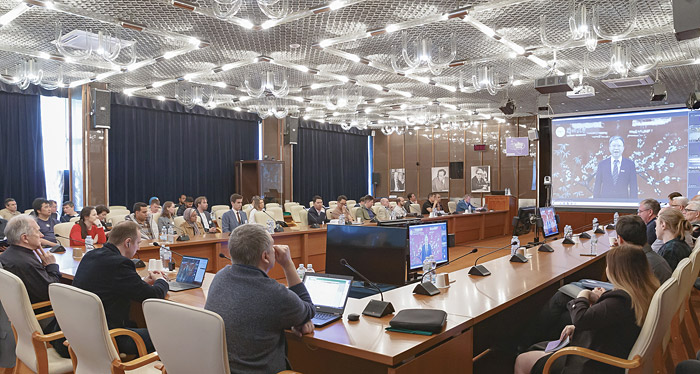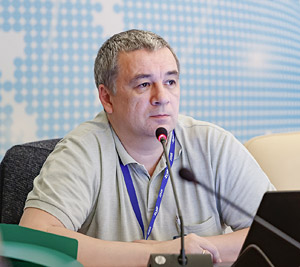
Electronic english version since 2022 |
The newspaper was founded in November 1957
| |
|
Number 23 (4671) |
Conferences
ISINN-29: formats change, traditions remain
On 29 May, the 29th International Seminar on Interaction of Neutrons with Nuclei (ISINN-29) started simultaneously in Dubna and Lanzhou (China), organized by FLNP JINR and the National Laboratory for Modeling and Effects of Intense Pulsed Radiation of the Northwest Institute of Nu-clear Technology (NINT, Xi'an, China) together with the Institute of Nuclear Science and Technol-ogy of Lanzhou University.
The Seminar was held in a mixed format, bringing together in Dubna over 90 partici-pants from FLNP and FLNR JINR, NRC "Kurchatov Institute", PNPI (Gatchina), SINP MSU, INR, INP (Novosibirsk), ITP (Chernogolovka), Moscow, Novosibirsk, Voronezh, Perm Universities, scientific centres of Belarus, Egypt, Kazakhstan, Russia. About 100 par-ticipants representing universities and research centres in China gathered in Lanzhou and a number of participants, including from Argentina, Vietnam, Bulgaria, India, Iran, Serbia, Singapore, USA, Turkey, Uzbekistan, France joined the Seminar online.

Opening the Seminar in Dubna, JINR Vice-Director L.Kostov reminded that ISINN has been counting since 1993 and if it were not for the Covid break, the current one would have become an anniversary one. Throughout its history, the Seminar has brought together specialists from various fields of neutron physics from many countries. The Vice-Director wished the participants good presentations and fruitful discussions. Prof. Dongwei Hei (NINT) and Academician Chonghua Yang (Langzhou University) congratulated the Seminar on a successful start. Plenary and section reports of the Seminar covered its tradi-tional topics: from the fundamental properties of the neutron to modern neutron sources, from advanced experiments to nuclear and related analytical techniques in environmental sciences and materials science.
I asked the Co-chairman of the Organizing Committee V.N.Shvetsov and the mem-ber of the Organizing Committee Yu.N.Kopach to sum up the preliminary results after four days of the Seminar.
 |
 |
| Yury Kopatch is conducting the meeting | Valery Shvetsov is ready to ask a question |
"It seems to us very good that the Seminar is held together with Chinese col-leagues," Yu.N.Kopatch emphasized. "Their science develops by leaps and bounds, especially in terms of developing new huge facilities and infrastructure projects. Such as for instance, they have recently opened a new CSNS source...
"... five years ago, in 2018," V.N.Shvetsov joins the conversation. "And if then the experimental hall, comparable to the two experimental halls at IBR-2, was com-pletely empty, today, judging by the slides that they have showed in the reports, there is no room to turn in. Almost all Chinese reports mention the national programmes they work on, meaning they have good support from their government. And we congratulate them with it!
Yu. K.: Several years ago, we proposed to them to include experiments with polarized neutrons in the research programme at CSNS, today, they have already pre-sented a report with a polarization facility based on 3He. And they would like to have a pro-ton polarizer and they also design an ultracold neutron source. The CSNS source runs a user programme and they mentioned that there are 2-3 proposals for an experiment from Gatchina and the Kurchatov Institute. It's amazing how quickly they do everything. There were many reports by Chinese colleagues that overlap with our topics. True, some of the reports, probably 30 percent, were difficult to understand because of the language barrier, although this also applies to some of our reports. I would also like to praise them for their punctuality. At the poster session, 5 minutes were given for the report, or rather, four min-utes for the report and a minute for questions. They fit in almost second by second, the performance was clearly built, without hesitation and pauses.
As for geography, there were many reports from India at this Seminar, almost 10, this is the advantage of the online format. They were made by a group with which we co-operate in the TANGRA project. Ajay Kumar came to us a few years ago and all the cur-rent speakers, in my opinion, are his students and graduate students. The reports were good. This group works in Varanasi, they haven't got an experimental facility, they make theoretical calculations and experimental work is carried out mainly on neutron sources in other scientific centres in India. There was a fairly good report from Argentina, a good re-port from Singapore, it is curious that they are also interested in neutrons.
Good reports were made by colleagues from PNPI (Gatchina), unfortunately, there was only one remote report from the Obninsk IPPE, although we expected a larger number of participants. A very interesting report was delivered by Vasily Shvedunov (SINP MGU) that fit perfectly into the meeting dedicated to neutron sources, two colleagues from No-vosibirsk came here, cooperating with us on the modernization programme of the EG-5 ac-celerator.
V. Sh.: This is a very strong team, there is a strong Sergey Yurievich Taskaev in the Novosibirsk INP. His main topic is boron neutron capture therapy and one of their accelerators is adapted for it. But there are many technical, technological problems that need to be studied. This is what his young team is engaged in: they scientifically solve every occurring problem to the end. Afterwards, dissertations are written and young people grow up. In this area, today they are leaders in Russia.
Yu. K.: There were just as many young people with posters from our side and from the Chinese side, as always, yet participation in our meetings is not intensive, for which we scold our youth.
A.S.Doroshkevich (FLNP) took part in the Seminar for the first time: In my opinion, this is a wonderful Seminar, it is held in a warm, homely atmosphere. I spoke about our work, the Chinese colleagues surprised me with their extent of engineering. The Seminar is very topical, serious issues of nuclear physics and radiation physics of materials were discussed. There are some points of contact. Probably, we will be able to find some new areas in our research in order to keep up with the times. I would like to participate in these Seminars in the future, as they are very informative and cognitive. Thanks to the or-ganizers for such a bright event.
Luis Ledo (FLNP, Cuba): I work in the Group of EG-5 and I want to thank for the unique opportunity to share the results of our work. This Seminar is a platform that allows one to multiply knowledge, to establish channels of cooperation and this is exactly what is required to facilitate the path to success.
"The format of the Seminar changes, in parallel, it is hold in China, as well as in an online format, probably, there is less live communication," I ask about the impressions of the longtime participant of the Seminar Yu.M.Chuvilsky (SINP MSU): You as-sessed right that psychologically this is a different Seminar. Of course, it is much more dif-ficult to organize it, one needs to be constantly ready for a breakdown in communication and the fact that the organizers withstood this load, in fact, having organized two Seminars, in Lanzhou and Dubna, they are just great. Of course, there is nostalgia and I would even find a sadder word for the old Seminar. The Covid break also took its toll, it took a tough toll on our community. I came here and asked why there was no Goverdovsky, no Zhuravlev and I got different answers. This is nostalgia not only for people, although people are the main, it is nostalgia for the style of communication. Perhaps, at the next Dubna Seminar, this will become familiar to us.
I gave a report on the first day. If there was a full hall and my reaction would be bet-ter, I would get wound up and get more questions, although there were questions online. The format is unusual, but it allowed people who could not come to Dubna to participate in the meeting. We will get used to the new, although it is still a little sad.

Poster session
Our lives change and the Seminar changes with it. Yet, the traditions remain: the same warm atmosphere, endless discussions during breaks and even at a picnic, also ac-cording to the ancient tradition preserved in the emblem of the Seminar. And a new gen-eration of children of young FLNP employees is chasing a ball in the picnic meadow that means ISINN is going on!
Olga TARANTINA,
photo by Elena PUZYNINA